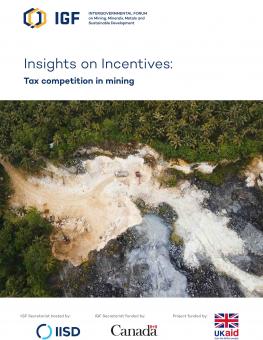
Insights on Incentives: Tax competition in mining
This paper highlights key findings from an analysis of the IGF Mining Tax Incentives Database, a collection of files comparing the fiscal regimes of 104 mining projects across 21 countries.
Resource-rich countries compete to attract mining investment but run the risk of offering poorly designed tax incentives.
The use of poorly designed tax holidays in mining leads countries to forgo vital revenues in exchange for unknown benefits—revenues which are needed to fund public services and infrastructure.
This paper highlights key findings from an analysis of the IGF Mining Tax Incentives Database, a collection of files comparing the fiscal regimes of 104 mining projects across 21 countries.
The database is the first large-scale, systematic attempt to compile tax incentives used by developing country governments to attract mining investment. It is also the first public effort to bring together incentives granted in mining contracts.
This is made possible through greater contract transparency—in particular, the availability of resource contracts compiled by the Natural Resource Governance Institute (NRGI), Columbia Center on Sustainable Investment (CCSI), the World Bank and Open Oil.
You might also be interested in
Artisanal and Small-Scale Mining of Critical Minerals
This report examines the potential for artisanal and small-scale mining (ASM) to take an expanded role in the global supply of critical minerals.
Leveraging Digital Infrastructure for Mining Community Resilience
This report explores the socio-economic impacts and potential of new technologies in the mining sector.
Navigating Global Sustainability Standards in the Mining Sector
This brief examines the latest developments and trends in responsible mining standards and voluntary sustainability initiatives.
IGF Case Study: Decarbonization of the Mining Sector
Case studies from Chile, Indonesia, and South Africa that delve into the role of the mining sector in efforts to reduce greenhouse gas (GHG) emissions.